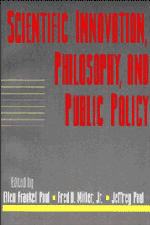Book contents
- Frontmatter
- Contents
- Introduction
- Acknowledgments
- Contributors
- The Human Genome Project: Research Tactics and Economic Strategies
- Choosing Who Will Be Disabled: Genetic Intervention and the Morality of Inclusion
- Germ-Line Genetic Engineering and Moral Diversity: Moral Controversies in a Post-Christian World
- Self-Critical Federal Science? The Ethics Experiment within the U.S. Human Genome Project
- When Politics Drives Science: Lysenko, Gore, and U.S. Biotechnology Policy
- Biotechnology and the Utilitarian Argument for Patents
- Property Rights Theory and the Commons: The Case of Scientific Research
- Property Rights and Technological Innovation
- Medicine, Animal Experimentation, and the Moral Problem of Unfortunate Humans
- A World of Strong Privacy: Promises and Perils of Encryption
- Computer Reliability and Public Policy: Limits of Knowledge of Computer-Based Systems
- Responsibility and Decision Making in the Era of Neural Networks
- Preposterism and Its Consequences
- Index
Germ-Line Genetic Engineering and Moral Diversity: Moral Controversies in a Post-Christian World
Published online by Cambridge University Press: 04 August 2010
- Frontmatter
- Contents
- Introduction
- Acknowledgments
- Contributors
- The Human Genome Project: Research Tactics and Economic Strategies
- Choosing Who Will Be Disabled: Genetic Intervention and the Morality of Inclusion
- Germ-Line Genetic Engineering and Moral Diversity: Moral Controversies in a Post-Christian World
- Self-Critical Federal Science? The Ethics Experiment within the U.S. Human Genome Project
- When Politics Drives Science: Lysenko, Gore, and U.S. Biotechnology Policy
- Biotechnology and the Utilitarian Argument for Patents
- Property Rights Theory and the Commons: The Case of Scientific Research
- Property Rights and Technological Innovation
- Medicine, Animal Experimentation, and the Moral Problem of Unfortunate Humans
- A World of Strong Privacy: Promises and Perils of Encryption
- Computer Reliability and Public Policy: Limits of Knowledge of Computer-Based Systems
- Responsibility and Decision Making in the Era of Neural Networks
- Preposterism and Its Consequences
- Index
Summary
INTRODUCTION: HUMAN NATURE IN THE PLURAL
The prospect of germ-line genetic engineering, the ability to engineer genetic changes that can be passed on to subsequent generations, raises a wide range of moral and public policy questions. One of the most provocative questions is, simply put: Are there moral reasons that can be articulated in general secular terms for accepting human nature as we find it? Or, at least in terms of general secular moral restraints, may we reshape human nature better to meet our own interests, as we define them? This question in turn raises the further question of whether human nature as it now exists has a moral standing akin to sacredness that can be understood in nonreligious terms. This essay will take as a given that it is not possible to show in general secular moral terms that human nature has a sanctity or special moral standing that should guide secular health-care policy. In addition, as this essay shows, it is not possible through appeals to considerations of authorizing consent or beneficence toward others to remedy this failure to establish a sanctity or special moral standing for human nature. Absent a religious or culturally normative understanding of human nature and given the availability of germline genetic engineering, there is a plurality of possibilities for refashioning our nature. The unavailability of substantive secular moral constraints on germ-line genetic engineering discloses a secularly licit plurality of possibilities for human nature.
- Type
- Chapter
- Information
- Scientific Innovation, Philosophy, and Public Policy , pp. 47 - 62Publisher: Cambridge University PressPrint publication year: 1996



